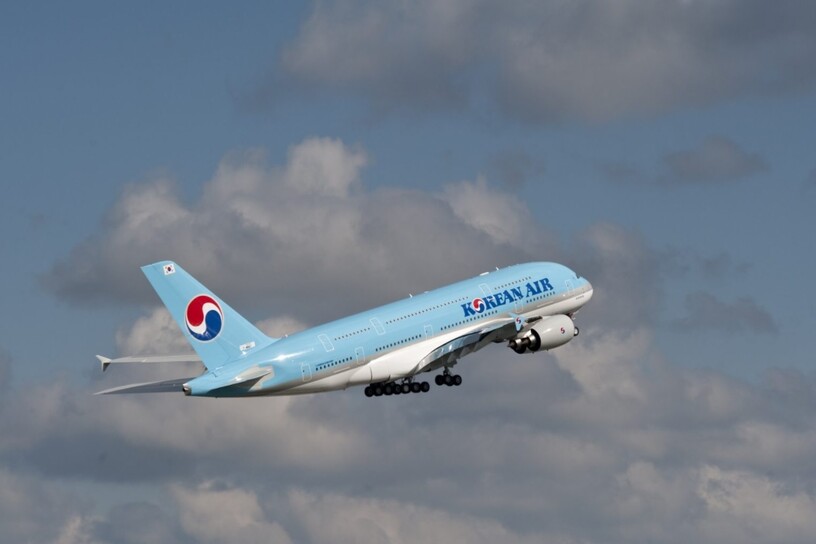Korean Air website capture
Eight domestic airlines, including Korean Air, filed a lawsuit against the Meteorological Administration against the increase in the’air weather information usage fee’ and recently lost the final. The air weather information fee is a fee charged by the Korea Meteorological Administration in exchange for providing weather information to international aircraft that land at Korean airports or pass through the airspace. The airlines filed a lawsuit with the intention that’meteorological office information wasn’t at a reasonable price’, but after a three-year lawsuit, they finally lost. We summarized the three-year lawsuits of the Meteorological Administration and the airline.
■ Meteorological Administration “loss of ‘44,000 won’ for each international flight landing”
The litigation dates back to 2018. Korean Air, Asiana Airlines, and low-cost carriers (LCC) Air Busan, Air Seoul, Eastar Jet, Jeju Air, Jin Air, T’way Air, etc. Filed a lawsuit for canceling the disposition of the increase According to the notice of the Meteorological Administration, the fee for using weather information based on landing has increased significantly, which is an illegal disposition, so it was requested to cancel. At the time, the Meteorological Administration set a fee for the use of meteorological information at 11,400 won for landing and 4820 won for transit flight. It was an 85% and 114% increase from the previous usage fee of 6170 won and 2210 won, respectively. The reason for the increase in rates for the Meteorological Administration was’realization of usage fees’. According to the World Meteorological Organization (WMO) recommendations in 2005, the Meteorological Administration has been charging airlines for information usage since 2005. From the beginning, the fee was set at less than 10% of the cost of information production, which resulted in losses. In addition, the contents pointed out by the National Assembly audit for several years from 2015 were also factored in the rate increase. At that time, the State Administration steadily pointed out that “the information usage fee was too low, and the Meteorological Administration gave preferential treatment to domestic and foreign civil airlines and covered the losses with taxes.” In fact, according to the judgment of the first trial, it was found that the fee for use compared to the production cost of aviation meteorological information, which was analyzed by the aviation meteorological agency affiliated with the Korea Meteorological Administration, was only 6.3%. As of 2014, the production cost was 18.9 billion won, but the amount collected by airlines in the same year was only 1.2 billion won. According to this analysis, from the viewpoint of the Meteorological Administration, each time an international flight landed at a Korean airport, it lost 44,406 won per flight, and 19,423 won per flight in the case of transit flights.
Korean Air and Asiana Airlines airliners are standing at Incheon International Airport. yunhap news
However, domestic airlines confronted that the measures taken by the Meteorological Administration were illegal. Airlines said in the court △According to the notice before the amendment, the rate of increase is “considering the inflation rate,” but this increase rate is 17.3 times the inflation rate. △Air weather information is public, and there are very few countries that charge usage fees, and it is reasonable to provide it free of charge. He argued that he had significantly deviated or abused his right to discretion.
■ “The inflation rate is just one criterion… 95% of the cost, such as the UK, is collected”
The first trial court dismissed most of these airlines’ claims and gave the Meteorological Administration’s hand. First of all, the court did not accept the airline’s argument that’the negotiations to increase the usage fee should follow the inflation rate’. The inflation rate is only one of several factors that determine the information usage fee, and it is judged that the inflation rate should not be determined absolutely in conjunction with the inflation rate. The court did not admit that there was no consultation with the Minister of Land, Infrastructure and Transport. This is because there was a meeting for information usage fees attended by the Meteorological Administration, the Ministry of Land, Infrastructure and Transport, and the Ministry of Land, Infrastructure and Transport did not raise objections to the Meteorological Administration’s increase. In addition, the United States, the United Kingdom, and France, which charge for the use of weather information, charge a fee of 95 to 100% of the cost of production.Air weather information is information that is used only by airlines, unlike general weather information, so it is appropriate to pay a fee. In that sense, the Meteorological Administration’s actions did not deviate or abuse its discretion. The second trial court ruled that the airline prevailed, saying, “The increase in the usage fee by 85% has significantly lost its validity in the common sense of society, and the Meteorological Administration has deviated or abused its discretionary power.” In July of last year, the Supreme Court said, “Since the Meteorological Administration has realized some of the usage fees, which have been significantly less than the cost, it is difficult to evaluate that the increase is not reasonable just because the rate of increase exceeds the rate of inflation. Even based on the increased amount, the estimated amount of usage fee collection is still only 15% of the cost of information production.” The 4-1 administrative division of the Seoul High Court (Judge Ki-Hoon Kwon), who heard the remand of the case for revocation of the case, dismissed the airline’s appeal in accordance with the purpose of the Supreme Court’s ruling on the 31st of last month. By Shin Min-jeong, staff reporter
newsletter
Every morning, every Thursday day
A friendly newsletter that will save you from the flood of news.
Meet
